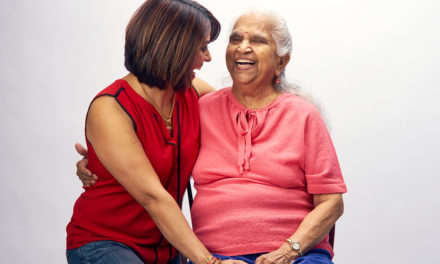Taneshia Nash Laird’s daily routine was simple. She drove her 2-year-old to preschool and her 6-year-old to elementary school, drove back to her in-laws’ house—where they were living temporarily—and got right in bed. She didn’t get out of bed until it was time to pick them up. She did this day after day, week after week. In the aftermath of her husband, Roland’s, sudden death of a heart attack 2 days after his 52nd birthday, that was all she had the strength for. “People called me. I didn’t call back,” Laird remembers. “I was in hibernation. I didn’t do anything. For months.”
Losing your husband of nearly 20 years when you’re 43 with two kids is not something you just brush off. The grieving process can be overwhelming, especially when you’re not only widowed without warning but suddenly a single parent as well.
Laird did much of her grieving on social media, and after one particularly emotional post about her younger daughter sharing memories of the day her daddy went to the hospital, a Facebook friend suggested she seek help with an organization called Good Grief, which has support centers in Morristown and Princeton. Laird and her daughters checked it out.
And finally, the healing process began.
Help Around the Corner
Founded in 2004 to provide education and advocacy about grief, Good Grief began offering direct service to families in 2007. That means peer support groups with trained facilitators, divided by age group (3-5, 6-9, 10-12, teenagers, young adults, and surviving parents).
One out of every seven children will experience the death of a parent or sibling before age 20, and 20,000 kids in New Jersey lose a parent each year. “The demand for our services is quite exceptional,” says Good Grief CEO Joe Primo. “The vision for Good Grief is to make sure there’s free support for children, teens, and families throughout New Jersey in the next decade. That’s our hope.”
Good Grief is one of more than 500 programs in the country that work with the National Alliance for Grieving Children (NAGC), which was founded in 2004, 30 years after the foundational grassroots movement to discuss childhood bereavement began. “The research we have, what it says very clearly, across the board, is that the relationship the child has to the surviving parent is the number-one predicting factor in how well that child will do in their grief,” says NAGC CEO Andy McNiel. “You can’t support children without supporting the parent of those children.”
And Then There’s You
You know those safety instructions you hear every time you fly, when flight attendants demonstrate how to put on the breathing mask and explain that parents should secure their own masks before doing the same for their children? Managing grief as a widowed parent runs along parallel lines. You can’t properly help your children until after you’ve placed a priority on helping yourself.
For Laird, now Mercer County’s regional director of the U.S. Women’s Chamber of Commerce and owner of her own consulting business, that meant realizing she had the right to avoid situations that made her unhappy. She had to understand that it was okay to say no to people in the name of her own mental and emotional health. “It’s only recently that I’ve actually been thinking about doing things for me,” she says. “For the first 16 or 17 months, everything I did was about my children. And that’s good. But I wasn’t doing any self care. It was guilt—my kids lost their father. But I lost my husband. I had to look out for myself, too.”
McNiel says one of the keystones of managing the grieving process is to let people help you. Rarely do we take friends up on their requests to “let me know if there’s anything I can do.” Or, if we do let someone help, before long we start to feel guilty about it and stop asking for their assistance.
“It’s a struggle to get your kids to all their after-school activities, even with two parents in the home,” McNiel says. “Think about the people in your life, and don’t be afraid to ask for their support with something like getting the kids to soccer. It’s different than asking for handouts. Maximize that, so you can have some time for you.”
Everyone grieves differently, but the most important thing to understand is that it’s not a closed-ended process. Elisabeth Kübler-Ross’s well-known “five stages of grief” theory is commonly misunderstood, as she was referring to the immediate aftermath of death and not the full grieving process.
“The grief experience is a lifelong trajectory,” says Primo. “In our culture, we’ve created an idea of a starting point and a finish line, but in reality it’s cyclical. Over time, it becomes more manageable as people develop coping skills to deal with their grief. But it’s a process that people carry with them for a lifetime. So our programs are unlimited. Families can meet with us for as long as they need our support.”








